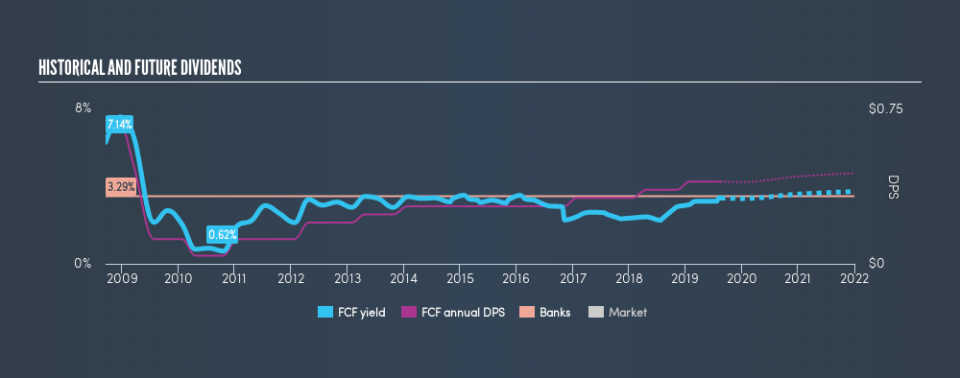What Makes First Commonwealth Financial Corporation (NYSE:FCF) A Great Dividend Stock?

Today we'll take a closer look at First Commonwealth Financial Corporation (NYSE:FCF) from a dividend investor's perspective. Owning a strong business and reinvesting the dividends is widely seen as an attractive way of growing your wealth. On the other hand, investors have been known to buy a stock because of its yield, and then lose money if the company's dividend doesn't live up to expectations.
In this case, First Commonwealth Financial likely looks attractive to investors, given its 3.2% dividend yield and a payment history of over ten years. It would not be a surprise to discover that many investors buy it for the dividends. The company also bought back stock during the year, equivalent to approximately 2.3% of the company's market capitalisation at the time. Some simple analysis can reduce the risk of holding First Commonwealth Financial for its dividend, and we'll focus on the most important aspects below.
Explore this interactive chart for our latest analysis on First Commonwealth Financial!
Payout ratios
Dividends are typically paid from company earnings. If a company pays more in dividends than it earned, then the dividend might become unsustainable - hardly an ideal situation. Comparing dividend payments to a company's net profit after tax is a simple way of reality-checking whether a dividend is sustainable. In the last year, First Commonwealth Financial paid out 37% of its profit as dividends. This is a middling range that strikes a nice balance between paying dividends to shareholders, and retaining enough earnings to invest in future growth. Plus, there is room to increase the payout ratio over time.
Consider getting our latest analysis on First Commonwealth Financial's financial position here.
Dividend Volatility
From the perspective of an income investor who wants to earn dividends for many years, there is not much point buying a stock if its dividend is regularly cut or is not reliable. For the purpose of this article, we only scrutinise the last decade of First Commonwealth Financial's dividend payments. Its dividend payments have fallen by 20% or more on at least one occasion over the past ten years. During the past ten-year period, the first annual payment was US$0.68 in 2009, compared to US$0.40 last year. This works out to be a decline of approximately 5.2% per year over that time. First Commonwealth Financial's dividend has been cut sharply at least once, so it hasn't fallen by 5.2% every year, but this is a decent approximation of the long term change.
A shrinking dividend over a ten-year period is not ideal, and we'd be concerned about investing in a dividend stock that lacks a solid record of growing dividends per share.
Dividend Growth Potential
Given that dividend payments have been shrinking like a glacier in a warming world, we need to check if there are some bright spots on the horizon. Strong earnings per share (EPS) growth might encourage our interest in the company despite fluctuating dividends, which is why it's great to see First Commonwealth Financial has grown its earnings per share at 20% per annum over the past five years. Earnings per share have been growing at a good rate, and the company is paying less than half its earnings as dividends. We generally think this is an attractive combination, as it permits further reinvestment in the business.
Conclusion
When we look at a dividend stock, we need to form a judgement on whether the dividend will grow, if the company is able to maintain it in a wide range of economic circumstances, and if the dividend payout is sustainable. We're glad to see First Commonwealth Financial has a low payout ratio, as this suggests earnings are being reinvested in the business. Unfortunately, the company has not been able to generate earnings per share growth, and cut its dividend at least once in the past. First Commonwealth Financial has a credible record on several fronts, but falls slightly short of our standards for a dividend stock.
Companies that are growing earnings tend to be the best dividend stocks over the long term. See what the 6 analysts we track are forecasting for First Commonwealth Financial for free with public analyst estimates for the company.
If you are a dividend investor, you might also want to look at our curated list of dividend stocks yielding above 3%.
We aim to bring you long-term focused research analysis driven by fundamental data. Note that our analysis may not factor in the latest price-sensitive company announcements or qualitative material.
If you spot an error that warrants correction, please contact the editor at editorial-team@simplywallst.com. This article by Simply Wall St is general in nature. It does not constitute a recommendation to buy or sell any stock, and does not take account of your objectives, or your financial situation. Simply Wall St has no position in the stocks mentioned. Thank you for reading.

